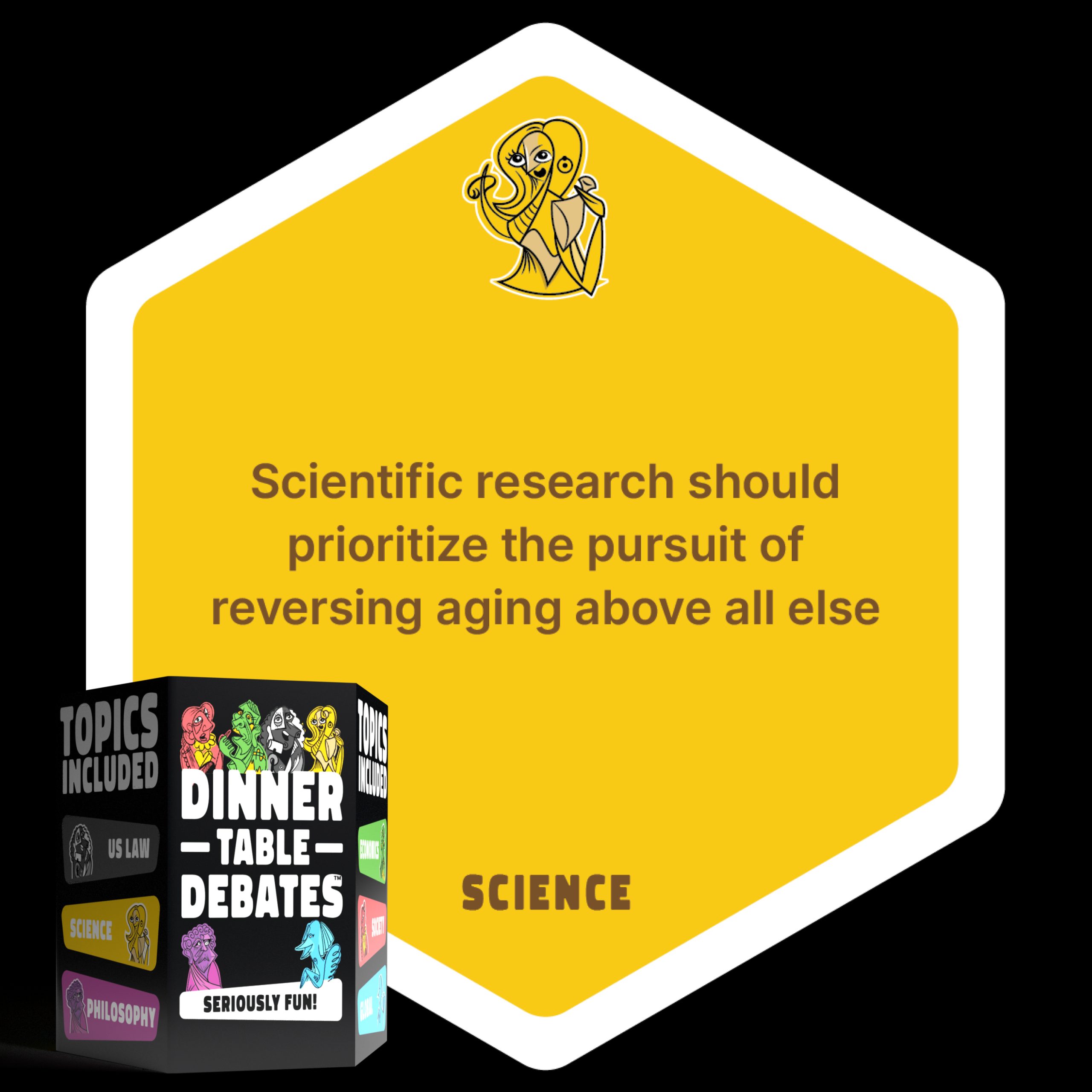Do you ever catch yourself staring into the mirror, pondering life’s big questions? Like, why do I sometimes feel an existential void after binge-watching a whole season of a show in one night? Or, perhaps the biggest question of all: Do I have a soul? It’s one of those topics that has inspired everything from ancient philosophy to awkward late-night dorm room conversations. But is the idea of a soul just a comforting bedtime story we tell ourselves, a popular Pixar film, or is there something deeper at play?
Welcome to your Dinner Table Debates Daily Deep Dive, where we explore real topics from our decks and give you everything you need to debate, in under 10 minutes. Today's topic is “Humans have a soul” and comes from our Full-Size Essentials Collection deck. Let’s dig in.
The concept of a soul dates back thousands of years, deeply rooted in religion, philosophy, and even pop culture. Ancient Greek philosophers like Plato believed in an immortal soul, which he described as the essence of human existence. Meanwhile, Aristotle thought the soul was more like a blueprint for the body—less mystical and more functional. In religious texts, from the Bible to the Quran, the soul is often depicted as the eternal part of us that connects with the divine. More recently, scientists and thinkers have debated the soul’s existence in the context of neuroscience and psychology. Is consciousness—that intangible “self” we all feel—proof of the soul, or just a byproduct of brain activity? Not to mention the countless movies and memes reminding us that if we sell our soul, we’d better negotiate a good deal.
Here’s a fun fact: A 2021 Pew Research study found that 73% of Americans believe in some form of a soul. And yet, the debate continues. Is the soul science, spirituality, or just good storytelling?
This topic matters because it touches on how we view life, death, and even morality. If humans have souls, it suggests we might have a deeper purpose or destiny. If not, well, we might need to reconsider those weekend existential crises. It’s a question that shapes how we treat each other, how we define identity, and how we approach some of life’s biggest mysteries.
Some argue that humans have a soul. Across cultures and histories, people have described near-death experiences, visions, and feelings of deep connection that science struggles to explain. Could this be the soul peeking through? A 2014 study found that 10-20% of people who survived cardiac arrest reported near-death experiences—many involving a sense of detachment from the body. Philosopher Rene Descartes argued, “I think, therefore I am,” suggesting that consciousness is fundamental to existence. Modern thinkers like Thomas Nagel have pointed out that no scientific explanation has fully accounted for the subjective experience of being. If we’re more than neurons firing, maybe the soul is what makes us “us.” Many religions tie the soul to morality, suggesting that it guides our sense of right and wrong. Without a soul, where does this inner compass come from? Theologian C.S. Lewis famously argued that humans’ universal moral code points to a spiritual origin.
Others argue that humans do not have a soul. Advances in neuroscience show that what we call the “soul” is likely a product of brain activity. When different parts of the brain are damaged, aspects of personality or memory can disappear. This suggests that our sense of self isn’t tied to a mystical soul but rather to neural processes. Despite centuries of belief, no concrete evidence for the soul has emerged. Attempts to measure the soul—like early 20th-century experiments weighing bodies before and after death—failed to produce reliable results. If souls exist, why can’t we find them? The concept of a soul may be more about human storytelling than reality. Anthropologist Clifford Geertz argued that cultures create myths and beliefs to make sense of the world. The soul could simply be our way of grappling with mortality and identity.
While near-death experiences are fascinating, they can often be explained by changes in brain chemistry during trauma. The release of chemicals like DMT might create these vivid sensations. On the other hand, just because we can map brain activity doesn’t mean we’ve fully understood consciousness. The soul could be the missing link, operating beyond what science can currently measure. This debate reminds us how complex and multi-layered the topic really is.
Discussions about the soul have even entered the realm of artificial intelligence. As we create increasingly human-like AI, questions arise: If an AI becomes self-aware, does it have a soul? These futuristic dilemmas push the boundaries of what we think defines a soul and consciousness.
Want to dig into this topic even more? Well, when you’re playing Dinner Table Debates at home, you can have Agree set the stage and choose how to define the debate. This means they can outline the terms, context, and interpretation, creating a unique and dynamic conversation every time. Here are some ways that Agree could redefine this debate topic: The soul exists but is tied to physical consciousness. What happens to the soul if the body is altered or augmented? Does a cloned human have a soul? Only humans have souls, not animals or AI. What differentiates humans from animals or machines in this context? Are emotions or morality part of the equation? The soul is not eternal but evolves with life experiences. Does this mean people can “grow” their souls? What happens to the soul after death in this scenario?If you enjoyed our deep dive, you can debate this topic and many more by getting your own Dinner Table Debates deck at DinnerTableDebates.com. It’s a unique game because every round starts with randomly assigning agree or disagree, then you pick the topic, meaning that you might be debating for something you disagree with or vice versa. But that’s the point! Stretch your brain, gain clarity, improve critical thinking and empathy, and have fun doing it! Save 10% on your order when you use the code PODCAST10. You can also join the debate on our Instagram and TikTok accounts at DinnerTableDebates. Get ready for some thought-provoking discussions that will challenge your assumptions and broaden your understanding of the world around you! Happy debating, and remember—everyone is always welcome at the table.

What if you could live to see your great-great-grandchildren graduate? Or what if scientists discovered a way to keep your mind sharp and body...

What if getting a college degree didn’t come with a lifetime of debt? Imagine if anyone could attend a public university without worrying about...

When you think about your job, what gives you security and a voice? Is it your personal achievements, the policies of your company, or...